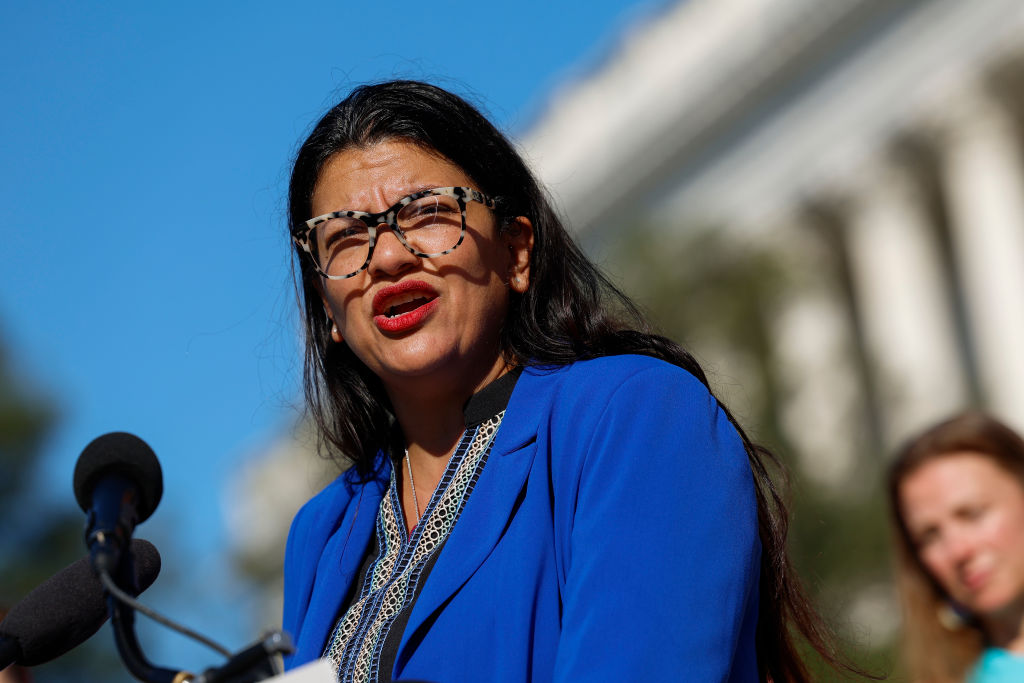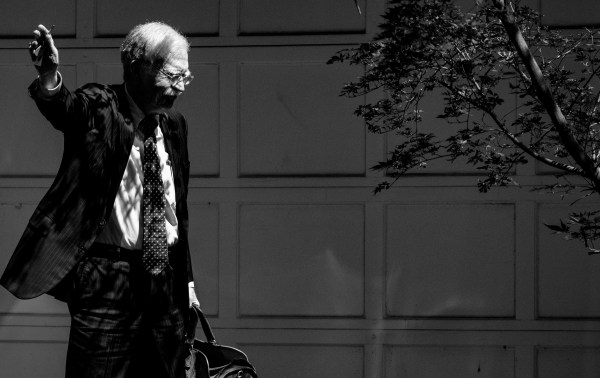On Wednesday morning the United States found itself managing two different crises involving Jordan.
The domestic Jordan fiasco is more comic than tragic and has nothing to do with the Middle East. Or almost nothing.
The foreign Jordan fiasco is grave. It began when news outlets reported that an Israeli airstrike had destroyed al-Ahli Baptist Hospital in Gaza, killing more than 500 Palestinians. Global media was outraged by the bloodletting; by evening, a crowd attempted to storm Israel’s embassy in the Kingdom of Jordan to take retribution. The king promptly canceled a summit he’d planned to host between Joe Biden and the leaders of Egypt and the Palestinian Authority, and he denounced the airstrike as a “shame on humanity.”
In an instant, a horrendous error had shifted the balance of diplomacy not just abroad but here at home:


Biden is visiting the Middle East this week to try to drum up support, by which I mean “grudging acquiescence,” among Sunni powers for Israel’s coming ground campaign against Hamas. The horror at the hospital left him suddenly stranded in that effort without the (even more grudging) backing of his progressive wing in Congress. “These unspeakable crimes must stop now,” Bernie Sanders declared in a statement after the airstrike. “The bombs and missiles from both sides must end, massive humanitarian aid must be rushed to Gaza, and the hostages must be returned to their families.” It was a debacle for Israel.
As I write this on Wednesday, it seems almost beside the point that every particular of the original report appears to have been wrong. The hospital wasn’t struck, its parking lot was. There are casualties, but photos circulating in the aftermath suggest it’s nowhere near 500.
And it wasn’t an Israeli missile that did the damage. It was, according to U.S. intelligence, a rocket fired by Palestinian jihadists.
For supporters of Israel who work in the media, writing about a hot war in which the country is involved is like trying to get traction on a sheet of ice. I remember it well from the conflict with Hezbollah in 2006: No matter how strenuously you and your allies struggle to counterprogram propaganda with truth, you’ll end up overwhelmed and feeling exasperated by how little your efforts have accomplished.
People who want to believe a lie won’t be talked out of it. We’ve had lots of experience with that phenomenon here in the U.S. in the past few years, but in matters involving Israel the task is an order of magnitude more difficult. There are too many decades of bad blood, too many falsehoods entrenched in global media, and frankly too much antisemitism to ever make much headway. It may be that a lie can travel halfway around the world before the truth has its boots on, as the saying goes, but lies never move with more velocity than when Israel is at war.
The apparent lie about the hospital bombing moved quickly enough to scuttle a major regional summit. All the Israeli military could do in the aftermath was try to embarrass those who had swallowed it by publishing the facts.
Hours after the explosion, with the New York Times already having carried forward Palestinian allegations of Israeli responsibility, the Israeli Defense Forces alleged that the blast had been caused by a rocket fired by Islamic Jihad that fell far short of its target in Israel. Surveillance footage confirmed a large detonation on the ground seconds after a barrage of rockets lifted off from Gaza. Later, Israeli intelligence released what it claimed was audio of two Hamas operatives admitting that the strike had come from their own side.
Daylight brought photos and video recorded by Palestinian observers that undercut the narrative further.
Damage was plainly done but not on the scale you’d expect from an airdropped Israeli bomb. There’s no rubble; the apparent impact crater isn’t much bigger than a person; the blast wave was weak enough that the hospital’s chapel looks to have suffered nothing worse than broken windows. One analyst went through images of the scene meticulously, comparing them to photos of the aftermath of Israeli air force airstrikes and Palestinian rocket detonations. The scene at the hospital resembles the latter, further corroborating the Israeli account of what happened.
As of Wednesday morning, U.S. intelligence had arrived at the same conclusion. The evidence is strong enough that Biden felt obliged to tell the Israeli press during his meeting with Benjamin Netanyahu that the carnage at the hospital appears to have been caused by “the other team.”
The Palestinian government in Gaza is run by Hamas, the same outfit that perpetrated the worst pogrom since the Holocaust as recently as 11 days ago. How is it that so many in the West uncritically accepted its word about what happened at the hospital on Tuesday?
My colleague Kevin Williamson will address that question tomorrow with respect to our curiously credulous media. America’s press spends half its time lecturing the unwashed for letting political prejudices numb them to misinformation, it sometimes seems, and the other half failing to take its own advice. It sounds absurd, but I earnestly believe this: Major American media organizations would be more diligent about challenging a sensational claim made by the RNC than one made by Hamas.
Neither of those organizations has any credibility at this point, granted. But if we’re going to apply different levels of skepticism to the two, I’d say more is warranted toward the one that’s actually murdering people, not the one that merely turns a blind eye whenever its supreme leader hints that murder might be a good idea.
For some journalists, taking Hamas claims at face value may be a simple matter of succumbing to peer pressure within the educated social class to which they belong and to which they cater. For others, the moral vehemence with which both sides of the Israeli-Palestinian conflict prosecute their case might be cowing them into “safe,” sludgy both-sides coverage that all but requires gullibility toward Palestinian claims. If the goal is evenhandedness and one of the two “hands” in question happens to belong to Hamas, some reporters will conclude they have no choice but to give Hamas’ claims the same weight as the Israeli government’s.
But we shouldn’t underestimate how the logic of anti-colonialism might motivate the West’s Hamas apologists inside the media just as it does those outside of it. If “decolonization” can justify mass murder, it can certainly justify repackaging mass death in a parking lot caused by friendly fire as an Israeli atrocity. If it can justify days of devout dug-in skepticism over whether Israeli infants were actually beheaded during Hamas’ rampage or “just” murdered, it can justify gulping down whatever swill the Hamas ministry of information barfs up about a hospital in Gaza being attacked.
As David Frum tersely put it, “The instinct to believe Hamas spokespeople is not an innocent mistake.”
Read Kevin tomorrow. For now, the question is why Tlaib, Omar, and other beacons of progress in Congress have yet to retreat from their initial credulity about what happened.
The speed with which Israel’s critics lunged at news of the bombing on Tuesday had the air of someone gasping after having turned blue from holding his breath. For 11 days, the Tlaibs and Omars of the left have been forced onto the defensive by the horrors committed by Hamas. It’s an intensely uncomfortable position for them, as the romance of being pro-Palestinian lies in the alleged moral authority derived from their eternal victimhood.
On October 7, the outfit that rules Gaza behaved so savagely against Israeli civilians that that authority was momentarily lost. Palestinian sympathizers in Congress and elsewhere could have resolved at that moment to draw a hard moral line between Hamas and the Palestinian people, but that presented a problem for them. The more they joined in the vilification of Hamas, the more justified an Israeli incursion into—and eventual reoccupation of—Gaza would logically be.
So they bit their lips, by and large. Occasionally one of them would pop up on television, word-salad-ing her way through non-answers to questions about how to keep Hamas from sporadically slaughtering Israelis absent military intervention …
… but mostly they kept their heads down and waited. They knew Israel would act and that, once it did, there would eventually be some terrible scene of mass death. The Hamas way of war guarantees it. When you co-opt civilian structures like schools and hospitals for military purposes, when you warn civilians not to follow Israeli orders to evacuate for safety’s sake, you’re looking to maximize the body count. Dead Palestinians are Hamas’ best defense against Israeli military power: Hamas can’t overcome the IDF in a fight, but it can make that fight sufficiently morally painful for the other side that the IDF will be pressured into backing off before it achieves its goal.
The West’s Palestinian sympathizers could foil that strategy by placing the onus for Palestinian casualties on Hamas rather than on Israel. But it’s unthinkable that they would ally themselves with the “colonizers,” even situationally toward the mutually beneficial end of freeing Gaza from Hamas’ grip. Especially when that colonizer’s government is led by a figure in Benjamin Netanyahu who supports Israeli settlements in the West Bank and whose view of political power has taken a distinctly Trumpian turn of late.
So instead they held their breath, waiting for Israel to miscalculate on the battlefield and restore the sense of victimhood that the Palestinian side had briefly lost. The hospital bombing appeared to deliver that. The order of the moral universe between the two sides had been set right. The Israelis were monsters too—the bigger monsters, even. Palestinian activists could exhale at last.
It must have seemed like a cruel joke to them when evidence began to mount that, actually, the monsters in this case were again jihadists, not the Israeli air force. It’s hard for people to admit error under the best circumstances, but those who had just recovered their moral authority after having lost it on October 7 weren’t about to hand it over again. Which is why, as of Tuesday night, the best Tlaib and Omar could do to answer that evidence was to tweet or retweet that people shouldn’t believe everything the Israeli government tells them.
And why, on Wednesday, when reporters confronted them with questions about responsibility for the bombing, neither had anything to say.
And why, as of Wednesday afternoon, Tlaib was still doubling down on blaming Israel for the attack.
It’s true that one shouldn’t believe everything the Israeli government says. All governments lie. During war, when they’re under threat, they lie a lot. Skepticism of government is healthy. But what Tlaib and Omar are offering is the decidedly less healthy proposition of skepticism toward the Israelis paired with unblinking credulity toward the terrorists on the other side. If taking Hamas’ claims about the hospital bombing at face value, while dispensing with all evidence to the contrary, isn’t pro-Hamas, what is it, precisely?
They’re also asking us to care less when Palestinians slaughter Palestinians, implicitly. Their colleague in Congress, Ritchie Torres, noticed that those who eagerly condemned Israel initially for the deaths at the hospital have yet to condemn the Islamic Jihad cell that apparently fired the fateful rocket. Saying that there’s a moral difference between an accident and a deliberate attack is not an answer: The rocket was designed to kill Israeli civilians, after all, before it ended up killing Palestinian ones. Either way, the victims are casualties of a terror campaign aimed at innocents.
Maybe Tlaib and Omar feel it would be hypocritical for them to condemn a Palestinian strike on a Palestinian hospital if they wouldn’t condemn a Palestinian strike on an Israeli hospital. (Points for consistency, I guess.) To some activists, the concept of “violence” is inextricable from victimhood; that’s why Hamas stampeding through a kibbutz, killing everyone in sight, isn’t violence worth condemning while a Hamas apologist failing to land a job at a white-shoe law firm is.
“Rashida Tlaib [has] more forcefully condemned Joe Biden over fake news than she has condemned the perpetrators of the inhuman terrorist attack that started this conflict,” Tim Miller wrote on Tuesday after Tlaib tweeted about the hospital bombing. Right, but that’s consistent with the ethos of violence and victimhood here. Violence is what’s done to the “powerless,” never what the “powerless” do to others.
As of Wednesday afternoon, nothing meaningful has changed in light of the revelations about the true culprit in the hospital bombing. Tlaib and Omar continue to defend the Larger Truth of Palestinian victimhood, even if the actual truth in this incident cuts the other way. The summit in Jordan remains canceled, and I suspect it is unlikely to be rescheduled. Jordan’s king might potentially be persuaded that Israel was innocent in the hospital bombing, but many of his subjects won’t be—and leaders fear antagonizing a radicalized constituency when it’s inflamed. We have some recent experience with that phenomenon too here in the U.S.
What also hasn’t changed are progressive demands for an immediate ceasefire.
They strike me as completely unserious, if not functionally pro-Hamas under the circumstances. To leave the perpetrators of the October 7 pogrom in place and unpunished is to invite them to do it again. It’s a nonstarter. Worse, to treat mass Palestinian casualties of the sort that happened at the hospital as cause for a ceasefire—knowing that a Palestinian outfit was likely responsible—is to incentivize more mass-casualty events. If lunatics like Hamas and Islamic Jihad can goose their Western apologists to pressure Israel to stand down simply by murdering a bunch of their own people, they have a very good reason to murder a bunch of their own people.
The next rocket attack at a hospital might not be accidental given the hideously credulous response to this one. People are quite likely to die because of this propaganda effort and its enablers, I fear. And, per the agitation outside the Israeli embassy on Tuesday in Jordan, not all will be Palestinian.
For now, I’m looking forward to returning to the more comic Jordan that’s been in the news lately, the one that has nothing to do with Hamas, Rashida Tlaib, or Ilhan Omar. Well, almost nothing.







Please note that we at The Dispatch hold ourselves, our work, and our commenters to a higher standard than other places on the internet. We welcome comments that foster genuine debate or discussion—including comments critical of us or our work—but responses that include ad hominem attacks on fellow Dispatch members or are intended to stoke fear and anger may be moderated.
With your membership, you only have the ability to comment on The Morning Dispatch articles. Consider upgrading to join the conversation everywhere.